
Charlotte "Chattie" Cooper Sterry was an English female tennis player who won five singles titles at the Wimbledon Championships and in 1900 became Olympic champion. In winning in Paris on 11 July 1900, she became the first female Olympic tennis champion as well as the first individual female Olympic champion.

Reginald "Reggie" or "R. F." Frank Doherty was a British tennis player and the older brother of tennis player Laurence Doherty. He was known in the tennis world as "R.F." rather than "Reggie". He was a four-time Wimbledon singles champion and a triple Olympic Gold medalist in doubles and mixed doubles.

The United Kingdom of Great Britain and Ireland competed as Great Britain at the 1900 Summer Olympics in Paris, France. It was the second appearance of Britain after having participated in the inaugural 1896 Games. In Olympic competition, the nation has always shortened its official name to Great Britain rather than the United Kingdom seen elsewhere.

Harold Segerson Mahony was a Scottish-born Irish tennis player who is best known for winning the singles title at the Wimbledon Championships in 1896. His career lasted from 1888 until his death in 1905. Mahony was born in Scotland but lived in Ireland for the majority of his life; his family were Irish including both of his parents, the family home was in County Kerry, Southwestern Ireland. He was the last Scottish born man to win Wimbledon until the victory of Andy Murray at the 2013 championships.
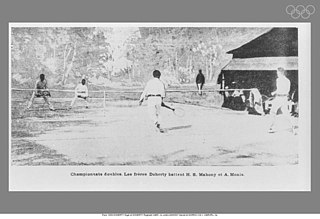
The men's doubles was an event on the tennis at the 1900 Summer Olympics program in Paris from 6 to 11 July. Sixteen players from 3 nations competed as eight pairs, including two mixed teams. The event was won by brothers Laurence Doherty and Reginald Doherty, defeating Max Décugis of France and Basil Spalding de Garmendia of the United States in the final. With no bronze-medal match, bronzes went to two teams: the French pair of Guy de la Chapelle and André Prévost and the British pair of Harold Mahony
Arthur Norris.
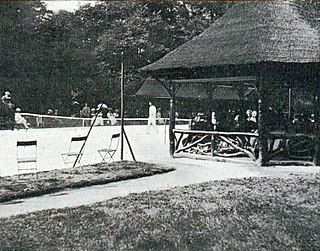
The mixed doubles was an event on the Tennis at the 1900 Summer Olympics program in Paris. It was held from 6 to 11 July at the Île de Puteaux. There were 12 competitors from 4 nations, with 3 of the teams being mixed teams. The event was won by British pair Charlotte Cooper and Reginald Doherty. The other three medals were taken by the three mixed teams: Hélène Prévost of France and Harold Mahony of Great Britain earned silver, while the bronze medals went to the Bohemian/British combination of Hedwiga Rosenbaumová and Archibald Warden and the American/British pair of Marion Jones and Laurence Doherty. All 5 of the British players thus ended up receiving a medal.

The men's singles was one of two tennis events on the Tennis at the 1896 Summer Olympics programme. The sixteen entrants were seeded into a single-elimination tournament, with only thirteen or fifteen of the players actually competing. They represented six nations.
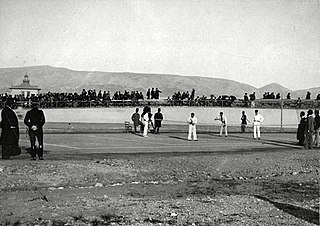
The men's doubles was one of two tennis events on the tennis at the 1896 Summer Olympics programme. The six pairs that entered were seeded into a single elimination tournament. Only five actually competed, hailing from four nations but entering as three Greek teams and a pair of mixed teams. It was the only event in the 1896 Summer Olympics that had mixed teams.

The men's (outdoor) singles was one of six lawn tennis events on the Tennis at the 1908 Summer Olympics programme. The tournament was played on grass courts at the All England Lawn Tennis and Croquet Club. There were 31 competitors from 9 nations. Nations could enter up to 12 players. The event was won by Major Ritchie of Great Britain, the nation's third victory in four Games. Otto Froitzheim earned Germany's first medal in the event with his silver. Another Briton, Wilberforce Eaves, took bronze.

The women's singles (outdoor) was one of six lawn tennis events on the Tennis at the 1908 Summer Olympics programme. The number of withdrawals resulted in empty brackets, with one player making it to the final without playing a single match while another had to win two to advance to that point. Nations could enter up to 12 players. In all, 13 women from 4 nations were entered but only 5 from Great Britain competed. The tournament was held from 7 to 11 July at the All England Lawn Tennis and Croquet Club. It was won by Dorothea Douglass Lambert Chambers, with Dora Boothby taking silver and Ruth Winch bronze.

The men's outdoor doubles' was one of six lawn tennis events on the Tennis at the 1908 Summer Olympics programme. Nations could enter up to 6 pairs. The event was plagued by withdrawals, with only 12 teams competing of the 21 that entered. There were 24 players from 8 nations. The event was won by Reginald Doherty and George Hillyard after defeating James Cecil Parke and Major Ritchie in the final. Clement Cazalet and Charles P. Dixon took the bronze medal without a bronze-medal match due to the withdrawal of an entire quadrant of the bracket. All three medal pairs were British. It was the second medal sweep in the men's doubles, after the United States did it in 1904, and it was also the last time that the men's doubles gold medal match was contested by pairs representing the same nation until Tokyo 2021. Doherty became the first man to win multiple men's doubles medals and gold medals, having earned gold with his brother Laurence Doherty in 1900.
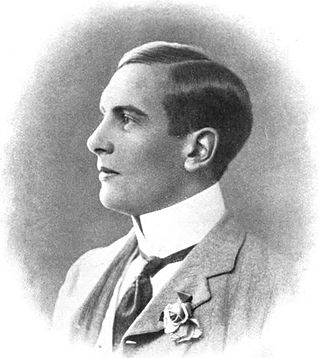
Frank Lorymer Riseley was a British tennis player. He was a three time Wimbledon singles finalist, two time Wimbledon doubles champion and won ten career singles titles.
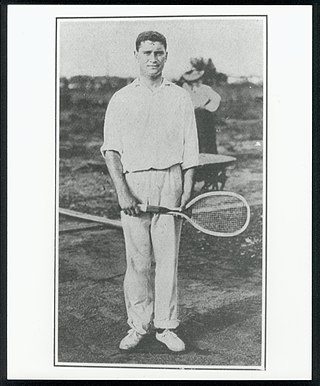
The men's doubles was a tennis event held as part of the Tennis at the 1904 Summer Olympics programme. It was the third time the event was held at the Olympics. There were 30 players from 2 nations, comprising 15 pairs including one mixed team. Only one player was from outside the United States; all medals were won by Americans. The event was won by Edgar Leonard and Beals Wright, defeating Alphonzo Bell and Robert LeRoy in the final. The two bronze medal pairs were Clarence Gamble (tennis)/Arthur Wear and Joseph Wear/Allen West. The medals were the first credited to the United States in the men's doubles, though an American had been part of a silver medal mixed team in 1900.
The 1896 Wimbledon Championships took place on the outdoor grass courts at the All England Lawn Tennis Club in Wimbledon, London, United Kingdom. The tournament ran from 13 July until 21 July. It was the 20th staging of the Wimbledon Championships, and the first Grand Slam tennis event of 1896. The number of entries for the men's singles competition was 31, the highest since 1881. Harold Mahony and Charlotte Cooper won the singles titles. The All England Plate was introduced for players who had lost in the first or second round of the singles.

The outdoor men's doubles competition at the 1912 Summer Olympics was part of the tennis program for the games. There were 42 players from 10 nations, comprising 21 teams. Nations were limited to 4 pairs each. The event was won by South African team Harold Kitson and Charles Winslow, defeating Austrians Felix Pipes and Arthur Zborzil in the final. It was the first medal in the event for both nations. France earned its first men's double since 1900 as Albert Canet and Édouard Mény de Marangue defeated Jaroslav Just and Ladislav Žemla of Bohemia in the bronze-medal match.
Laurence Doherty defeated Harold Mahony 6–1, 6–2, 4–6, 2–6, 14–12 in the All Comers Final, but the reigning champion Reginald Doherty defeated Laurence Doherty 6–3, 6–3, 2–6, 5–7, 6–1 in the challenge round to win the gentlemen's singles tennis title at the 1898 Wimbledon Championships.

Hugh Laurence "Laurie" Doherty was a British tennis player and the younger brother of tennis player Reginald Doherty. He was a six-time Grand Slam champion and a double Olympic Gold medalist at the 1900 Summer Olympics in singles and doubles. In 1903 he became the first non-American player to win the U.S. National Championships.
Andy Murray defeated Novak Djokovic in the final, 6–4, 7–5, 6–4 to win the gentlemen's singles tennis title at the 2013 Wimbledon Championships. He became the first Briton to win the title since Fred Perry in 1936, ending a 76-year drought, as well as the first British winner in singles since Virginia Wade won the women's event in 1977. He was also the first Scot to win the title since Harold Mahony in 1896.

This was a tennis rivalry played between British player Laurence Doherty and the Irish player Harold Mahony, which in their respective careers met 18 times from 1896 until 1904.
Laurence Doherty and Reginald Doherty defeated Harold Mahony and Major Ritchie 8–6, 6–2, 6–2 in the All Comers' Final, and then defeated the reigning champions Frank Riseley and Sydney Smith 6–4, 6–4, 6–4 in the challenge round to win the gentlemen's doubles tennis title at the 1903 Wimbledon Championships.















